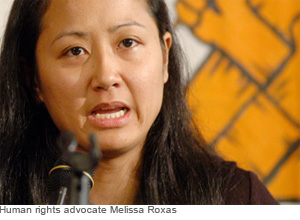Melissa Roxas, the U.S. citizen who was abducted and tortured in the Philippines in May, was released on May 25 and dropped off at her uncle's house by her captors. She was given a cell phone and was threatened repeatedly by them even after her release, as she described in her recent press conference:
The military said something bad would happen if I said anything to anyone. They especially did not want me to talk with [Philippine human rights group] Karapatan. I was very fearful and that is why I wanted to go home to the United States as soon as possible to seek safety and reunite with my family here.
Except for her U.S. citizenship, the experience of Ms. Roxas is typical of the 200 cases of abduction and 1,010 cases of torture recorded since Gloria Macapagal Arroyo became president of the Philippines in 2001. The Philippine government's quick denial of responsibility for Ms. Roxas' abduction and torture is also typical. In his 2007 report on human rights in the Philippines, U.N. Special Rapporteur Philip Alston cited such systematic denial by the government as one of the primary obstacles to stopping the rampant human rights violations plaguing the country.
To draw attention to the criminal acts committed with impunity -- and, there is good reason to believe, by state forces -- under the Arroyo administration, Ms. Roxas is determined to speak out, despite the difficulty of doing so:
It was very hard to talk about what happened because of the emotional and psychological effects of my abduction and torture. After it happened, I did not want to leave the house at all; it was very hard for me to go even outside of the room. I was also still very weak physically because of my wounds.
Although it is still very difficult to talk about the incident, I wanted to tell the truth about what happened to me. I don't want what happened to me to happen to anybody else ever again. I want the world to know what happened because the Philippine government and military should not get away with what they did to me, to Juanito, to John Edward. And they cannot get away with what they did to many other people. There are still families looking for their loved ones, and there are many more still missing.
I plan on pursuing the case for as long as it takes.... I am asking the American people and the Filipino people, and all believers of truth and justice to help me, and help the victims of human rights violations to get justice. It has to end. The killings, the enforced disappearances, the abductions, and the torture have to end.
Every day since my abduction and torture the nightmares of what happened often return to me, and talking about that experience is like going back again to that dark place. But knowing that I spoke the truth about what happened keeps that deep sea of injustice, silence, and fear from drowning me ... and instead I get to keep that bit of light inside.
The two Filipino health workers who were abducted with Roxas, John Edward Jandoc and Juanito Carabeo, have reportedly been released, but have not spoken publicly about their experiences for fear of retribution to themselves and their families.
 Katrina Abarcar coordinates the work of Katarungan, which seeks to promote peace, justice, and human rights in the Philippines through research, education, and grassroots advocacy.
Katrina Abarcar coordinates the work of Katarungan, which seeks to promote peace, justice, and human rights in the Philippines through research, education, and grassroots advocacy.
Got something to say about what you're reading? We value your feedback!
 [continued from part 1]
[continued from part 1]